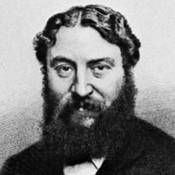
T.W. Robertson, 1860s
PD-US
Thomas William Robertson
Playwright, Librettist
Biography
Thomas William Robertson
Thomas William Robertson was born in Nottinghamshire, the son of theatrical parents who performed in the provincial circuits. After growing up in Lincolnshire, he moved to London in 1848 to pursue a career as an actor. He was engaged by Madame Vestris as a prompter in 1854, but soon abandoned performing in favor of writing. His first original play, a one-act farce entitled The Cantab, was produced in 1861. From 1865 to 1870 Robertson wrote a string of plays produced by Squire and Marie Bancroft at the Prince of Wales Theatre in London. These plays--Caste, Society, Ours, Play, School, and M.P.-- were popular hits and made Robertson a household name. Society, his first play produced by the Bancrofts, became widely acknowledged as a milestone in Victorian drama due to the realism of its dialogue, costumes, and set. His third play, Caste, became his most popular and regularly produced work. Robertson also wrote the libretto to the comic opera Constance (1865).
All of Robertson’s plays (sometimes known as ‘problem plays’) addressed real social and domestic issues of the time. They were far removed from the exaggerated Victorian melodrama favored during this period and became known as early proponents of the “cup and saucer” drama, which highlighted domestic realism and believable, ‘real’ relationships. Unusually, Robertson both wrote and directed all of his plays.
Robertson married twice; firstly to Elizabeth Taylor, with whom he had four children, and then following her death to Rosetta Elizabeth Rodmill Feist, with whom he had two more children. He died in 1871 at the age of 42 and was buried with his first wife.
Shows
Shows associated with Thomas William Robertson
Monologues
Monologues from shows associated with Thomas William Robertson
Scenes
Scenes from shows associated with Thomas William Robertson
Quizzes
Quizzes associated with Thomas William Robertson
Learning Modules
Learning modules associated with Thomas William Robertson
Additional Information
N/A